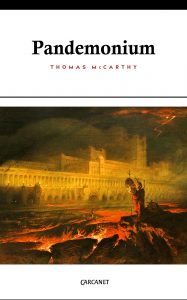Pandemonium
 Thomas McCarthy’s new collection Pandemonium is a war cry. Written post-economic collapse in Ireland (2008), he uses the tools of his trade to rage, amass and, ultimately, heal:
Thomas McCarthy’s new collection Pandemonium is a war cry. Written post-economic collapse in Ireland (2008), he uses the tools of his trade to rage, amass and, ultimately, heal:
(…) let pandemonium
Cease, let the wild confetti of poets
Be withdrawn from the bitterness of the streets.
This passionate, thoughtful collection is at once a response to modern Ireland, a memory of old Ireland, and a hopeful love letter to a future Ireland.
The land is not yet settled
After our years of pandemonium.
This time it is almost too late[.]
The poems are vastly and purposefully different in technique. Shifting in length and metre, McCarthy leads us around the modern Ireland’s streets. We dip into empty book stores and shuffle through contemporary underground market stalls; then mixing rhyme with free verse, we move deeper through historically cruel times and melancholy landscapes, as the narrator attempts to find his bearings in this altered nation.
The geography of Pandemonium is shown in the natural imagery – the sea is both a comforting comrade and a hostile enemy; its intentions shifting with the waves.
The sea recedes again with it’s fabulous ingratitude. It leaves
The mark of it’s eating on the least sand;(…)
You walk the between – world of the seashore,
Neither seal, nor dog but metamorphosis.
This is where the universe dropped us.
No longer recognising his home as home McCarthy tries endlessly to reacquaint himself. Descriptions of the landscape are detailed and respectful, both beautiful and terrifyingly real. Revisiting his Ireland of the past, nostalgia and resentment paint a romanticised gloss over an uncomfortable, if somewhat simpler, time:
I’ve been thinking of my mother’s life, the sheer audacity
Of her kindness, of her unbridled largesse. She who hadNothing or little to give gave more than the shirt off her back,
Gave the skin of her hands to break wet firewood in a hard frost
During the long winter of 1962-63. (…)The sky of Ireland,
That bitter, grey, unforgiving Blackwater sky, that bitterWind, that wind of snobbery and schadenfreude, that bitter
Chill of the bitter with their double stiches of bitterness [.]
Yet McCarthy repeats himself just Irish history has. He satirises his own rose-tinted glasses. Angry, but not without humour, his acerbic wit leaps from cold, wintry pages. He uses animalistic metaphors to explore the inequality between the different classes:
And fresh leaves turning like small finches in the breeze,
Birds anchored at the node, full of necessitiesOf birdlife and sickened by the thought of trees
I button your dress by the window, kiss your bare kneesWith all the abandon of the penniless. Come, let us
Walk back to the year when we last borrowed money, let usEase our quantitative selves: the bird that stole my pay cheque
Has left the land in winter clothes, is never coming back.
Yet, despite all, the poet is still hopeful. He equates his island with the entirety of our fractured world. Rather than be broken by this realisation, he utilises his passion and anger to bring the people together. In “At Ink Level, The Sea”, he makes writing a metaphor for our planet:
Here on the writing desk of the earth
The sun goes down at ink level.
For McCarthy there is healing in words. This collection is not simply that war cry, but more accurately a rallying call, to all other creators to raise their voices. He cannot predict the fate of his country – nor of his world –
Am I going out of coming in with the sea?
Undoubtedly, however, he feels that there may be hope on the horizon.
Is it time to go in
Or is it time to go outside? Only time
Will tell me how the levels rise –
Phrases cluster on the sunlit page[.]
If McCready’s Pandemonium does apply to the world at large, let us all hope that he is right.

Leave a Reply